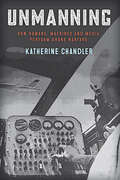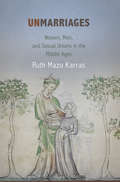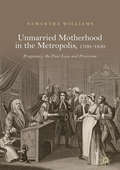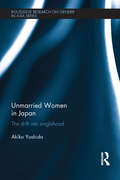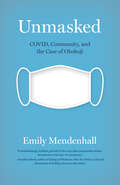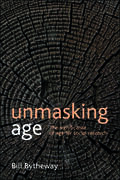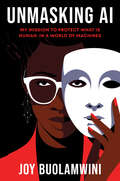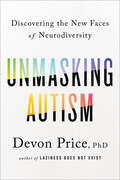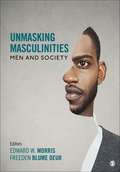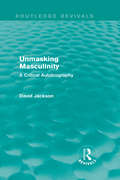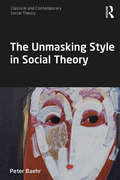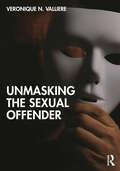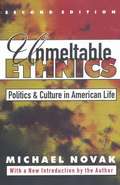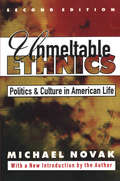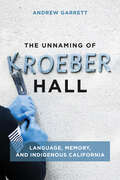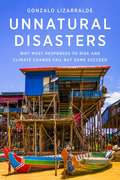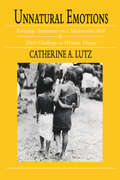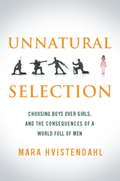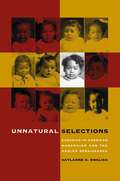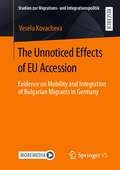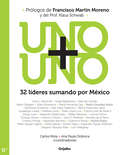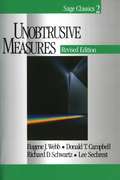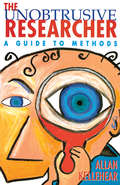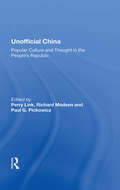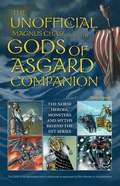- Table View
- List View
Unmanning: How Humans, Machines and Media Perform Drone Warfare (War Culture)
by Katherine ChandlerUnmanning studies the conditions that create unmanned platforms in the United States through a genealogy of experimental, pilotless planes flown between 1936 and 1992. Characteristics often attributed to the drone—including machine-like control, enmity and remoteness—are achieved by displacements between humans and machines that shape a mediated theater of war. Rather than primarily treating the drone as a result of the war on terror, this book examines contemporary targeted killing through a series of failed experiments to develop unmanned flight in the twentieth century. The human, machine and media parts of drone aircraft are organized to make an ostensibly not human framework for war that disavows its political underpinnings as technological advance. These experiments are tied to histories of global control, cybernetics, racism and colonialism. Drone crashes and failures call attention to the significance of human action in making technopolitics that comes to be opposed to “man” and the paradoxes at their basis.
Unmarriages
by Ruth Mazo KarrasThe Middle Ages are often viewed as a repository of tradition, yet what we think of as traditional marriage was far from the only available alternative to the single state in medieval Europe. Many people lived together in long-term, quasimarital heterosexual relationships, unable to marry if one was in holy orders or if the partners were of different religions. Social norms militated against the marriage of master to slave or between individuals of very different classes, or when the couple was so poor that they could not establish an independent household. Such unions, where the protections that medieval law furnished to wives (and their children) were absent, were fraught with danger for women in particular, but they also provided a degree of flexibility and demonstrate the adaptability of social customs in the face of slowly changing religious doctrine.Unmarriages draws on a wide range of sources from across Europe and the entire medieval millennium in order to investigate structures and relations that medieval authors and record keepers did not address directly, either in order to minimize them or because they were so common as not to be worth mentioning. Author Ruth Mazo Karras pays particular attention to the ways women and men experienced forms of opposite-sex union differently and to the implications for power relations between the genders. She treats legal and theological discussions that applied to all of Europe and presents a vivid series of case studies of how unions operated in specific circumstances to illustrate concretely what we can conclude, how far we can speculate, and what we can never know.
Unmarried Motherhood in the Metropolis, 1700–1850: Pregnancy, The Poor Law And Provision
by Samantha WilliamsIn this book Samantha Williams examines illegitimacy, unmarried parenthood and the old and new poor laws in a period of rising illegitimacy and poor relief expenditure. In doing so, she explores the experience of being an unmarried mother from courtship and conception, through the discovery of pregnancy, and the birth of the child in lodgings or one of the new parish workhouses. Although fathers were generally held to be financially responsible for their illegitimate children, the recovery of these costs was particularly low in London, leaving the parish ratepayers to meet the cost. Unmarried parenthood was associated with shame and men and women could also be subject to punishment, although this was generally infrequent in the capital. Illegitimacy and the poor law were interdependent and this book charts the experience of unmarried motherhood and the making of metropolitan bastardy.
Unmarried Women in Japan: The drift into singlehood (Routledge Research on Gender in Asia Series)
by Akiko YoshidaYoshida addresses the common misconceptions of single, never-married women and aims to uncover the major social and cultural factors contributing to this phenomenon in Japan. Based on interviews with married and never-married women aged 25-46, she argues that the increasing rate of female singlehood is largely due to structural barriers and a culture that has failed to keep up with economic changes. Here is an academic book that is also reader-friendly to the general audience, it presents evidence from the interview transcripts in rich detail as well as insightful analysis. Important sociological concepts and theories are also briefly explained to guide student readers in making connections. Thus, this book not only serves to enlighten readers on current issues in Japan – it also provides sociological perspectives on contemporary gender inequality.
Unmasked: COVID, Community, and the Case of Okoboji
by Emily MendenhallUnmasked is the story of what happened in Okoboji, a small Iowan tourist town, when a collective turn from the coronavirus to the economy occurred in the COVID summer of 2020. State political failures, local negotiations among political and public health leaders, and community (dis)belief about the virus resulted in Okoboji being declared a hotspot just before the Independence Day weekend, when an influx of half a million people visit the town. The story is both personal and political. Author Emily Mendenhall, an anthropologist at Georgetown University, grew up in Okoboji, and her family still lives there. As the events unfolded, Mendenhall was in Okoboji, where she spoke formally with over 100 people and observed a community that rejected public health guidance, revealing deep-seated mistrust in outsiders and strong commitments to local thinking. Unmasked is a fascinating and heartbreaking account of where people put their trust, and how isolationist popular beliefs can be in America's small communities.
Unmasking age: The significance of age for social research
by Bill BythewayWhat is age? A simple question but not that easy to answer. 'Unmasking Age' addresses it using data from a series of research projects relating to later life. This is supplemented by material from a range of other sources including diaries and fiction. Drawing on a long career in social research, Bill Bytheway critically examines various methods and discusses ways of uncovering the realities of age.
Unmasking AI: My Mission to Protect What Is Human in a World of Machines
by Joy BuolamwiniNATIONAL BESTSELLER • &“The conscience of the AI revolution&” (Fortune) explains how we&’ve arrived at an era of AI harms and oppression, and what we can do to avoid its pitfalls.&“Dr. Joy Buolamwini has been an essential figure in bringing irresponsible, profit-hungry tech giants to their knees. If you&’re going to read only one book about AI, this should be it.&”—Darren Walker, president of the Ford Foundation A LOS ANGELES TIMES BEST BOOK OF THE YEAR • Shortlisted for the Inc. Non-Obvious Book AwardTo most of us, it seems like recent developments in artificial intelligence emerged out of nowhere to pose unprecedented threats to humankind. But to Dr. Joy Buolamwini, who has been at the forefront of AI research, this moment has been a long time in the making.After tinkering with robotics as a high school student in Memphis and then developing mobile apps in Zambia as a Fulbright fellow, Buolamwini followed her lifelong passion for computer science, engineering, and art to MIT in 2015. As a graduate student at the &“Future Factory,&” she did groundbreaking research that exposed widespread racial and gender bias in AI services from tech giants across the world.Unmasking AI goes beyond the headlines about existential risks produced by Big Tech. It is the remarkable story of how Buolamwini uncovered what she calls &“the coded gaze&”—the evidence of encoded discrimination and exclusion in tech products—and how she galvanized the movement to prevent AI harms by founding the Algorithmic Justice League. Applying an intersectional lens to both the tech industry and the research sector, she shows how racism, sexism, colorism, and ableism can overlap and render broad swaths of humanity &“excoded&” and therefore vulnerable in a world rapidly adopting AI tools. Computers, she reminds us, are reflections of both the aspirations and the limitations of the people who create them.Encouraging experts and non-experts alike to join this fight, Buolamwini writes, &“The rising frontier for civil rights will require algorithmic justice. AI should be for the people and by the people, not just the privileged few.&”
Unmasking Autism: Discovering the New Faces of Neurodiversity
by Devon PriceA deep dive into the spectrum of Autistic experience and the phenomenon of masked Autism, giving individuals the tools to safely uncover their true selves while broadening society&’s narrow understanding of neurodiversity&“A remarkable work that will stand at the forefront of the neurodiversity movement.&”—Barry M. Prizant, PhD, CCC-SLP, author of Uniquely Human: A Different Way of Seeing AutismFor every visibly Autistic person you meet, there are countless &“masked&” Autistic people who pass as neurotypical. Masking is a common coping mechanism in which Autistic people hide their identifiably Autistic traits in order to fit in with societal norms, adopting a superficial personality at the expense of their mental health. This can include suppressing harmless stims, papering over communication challenges by presenting as unassuming and mild-mannered, and forcing themselves into situations that cause severe anxiety, all so they aren&’t seen as needy or &“odd.&” In Unmasking Autism, Dr. Devon Price shares his personal experience with masking and blends history, social science research, prescriptions, and personal profiles to tell a story of neurodivergence that has thus far been dominated by those on the outside looking in. For Dr. Price and many others, Autism is a deep source of uniqueness and beauty. Unfortunately, living in a neurotypical world means it can also be a source of incredible alienation and pain. Most masked Autistic individuals struggle for decades before discovering who they truly are. They are also more likely to be marginalized in terms of race, gender, sexual orientation, class, and other factors, which contributes to their suffering and invisibility. Dr. Price lays the groundwork for unmasking and offers exercises that encourage self-expression, including:• Celebrating special interests• Cultivating Autistic relationships• Reframing Autistic stereotypes• And rediscovering your valuesIt&’s time to honor the needs, diversity, and unique strengths of Autistic people so that they no longer have to mask—and it&’s time for greater public acceptance and accommodation of difference. In embracing neurodiversity, we can all reap the rewards of nonconformity and learn to live authentically, Autistic and neurotypical people alike.
Unmasking Masculinities: Men And Society
by Edward Morris Freeden OeurUnmasking Masculinities: Men and Society is a new anthology that provides a fresh and comprehensive introduction to the field of critical masculinity studies. Grounded in the theories of masculinities with explicit connections between various theoretical perspectives and the readings, this book examines unique domains, such as the Presidency or men's responses to feminism. Through the book’s emphasis on cross-cultural perspectives and experiences, readers will find new and provocative takes on masculinity today, such as nerd masculinity, female masculinity, misogyny through social media, feminism and men, and men’s intimate relationships with other men.
Unmasking Masculinity: A Critical Autobiography (Routledge Revivals)
by David JacksonIn this detailed investigation of ‘masculine’ gendered identity, first published in 1990, David Jackson uses his own personal history to look at the specific ways in which men become ‘masculine’. In doing so he examines, but also offers some positive challenges to, the assumed qualities and values of growing up ‘manly’. Jackson looks closely at the psychological and social forces active in his own development: relations with his father, violence at school, male banter and joking, sporting activities, boys’ comics, and sexual relations. The title is a deliberate blend between life story and critical commentary that makes use of some areas of post-structuralist theory to make visible the social and emotional processes that contribute to one man’s life history. With an innovative theoretical approach, this reissue will be of particular value to those interested in the social, psychological and cultural forces that have gone into the historical shaping of men and masculinities.
The Unmasking Style in Social Theory (Classical and Contemporary Social Theory)
by Peter BaehrThis book examines the nature of unmasking in social theory, in revolutionary movements and in popular culture. Unmasking is not the same as scientific refutation or principled disagreement. When people unmask, they claim to rip off a disguise, revealing the true beneath the feigned. The author distinguishes two basic types of unmasking. The first, aimed at persons or groups, exposes hypocrisy and enmity, and is a staple of revolutionary movements. The second, aimed at ideas, exposes illusions and ideologies, and is characteristic of radical social theory since the eighteenth-century Enlightenment. The Unmasking Style in Social Theory charts the intellectual origins of unmasking, its shifting priorities, and its specific techniques in social theory. It also explores sociology’s relationship to the concept of unmasking through an analysis of writers who embrace, adapt or reshape its meaning. Such sociologists include Vilfredo Pareto, Karl Mannheim, Raymond Aron, Peter Berger, Pierre Bourdieu, Luc Boltanski and Christian Smith. Finally, taking conspiracy theories, accusations of social phobia and new concepts such as micro-aggression as examples of unmasking techniques, the author shows how unmasking contributes to the polarization and bitterness of much public discussion. Demonstrating how unmasking is baked into modern culture, yet arguing that alternatives to it are still possible, this book is, in sum, a compelling study of unmasking and its impact upon modern political life and social theory.
Unmasking the Sexual Offender
by Veronique N. ValliereThis book unmasks the sexual offender by providing clear, comprehensible information about the motivations, techniques, and dynamics of sexual offenders and their behavior. It not only explores the biases and myths that the reader may rely upon to understand deviance but also explains pathways to offending, the distorted thinking and relating that offenders engage in, and the ways offenders manipulate and exploit others. Sexual offenders are surrounded by mythology, fascination, and revulsion. People who commit sexual offenses present difficult and complicated issues interpersonally, as well as in treatment and management; denial, victim-blaming, aggression, and blatant chronic deception are inherent in interactions with them. Unfortunately, the failure to truly understand their motives and techniques helps provide excuses for and further camouflage of their deviance. The first part of the text explores the presumptions commonly adopted about sexual offenders and shows how misinformation supports the inappropriate behavior of the sexual offender. The second section focuses on exposing the sexual offender using straightforward language and tangible examples. A final, third section includes safety and management strategies for dealing with sex offenders for those both inside and outside the realms of law enforcement and offender supervision. This book is intended for anyone interested in learning about sexual offenders. It is useful for both professionals and non-professionals, including students, paralegals, victim advocates, and others involved in the criminal justice system or mental health field.
Unmeltable Ethnics: Politics And Culture In American Life (Second Edition)
by Michael NovakThis new, enlarged edition of an influential book--originally published in 1972 as The Rise of the Unmeltable Ethnics--extends the author's wise and generous view of ethnicity. Its aim "is to raise consciousness about a crucial part of the American experience: to involve each reader in self-inquiry. Who, after all, are you? What history brought you to where you are? Why are you different from others?" But the point of such inquiry is civility: "The new ethnic consciousness embodied in this book delights in recognition of subtle differences in the movements of the soul. It is not a call to separatism but to self-consciousness. It does not seek division but rather accurate, mutual appreciation."
Unmeltable Ethnics: Politics and Culture in American Life
by Michael NovakThis new, enlarged edition of an influential book originally published in 1972 as The Rise of the Unmeltable Ethnicsextends the author's wise and generous view of ethnicity. Its aim "is to raise consciousness about a crucial part of the American experience: to involve each reader in self-inquiry. Who, after all, are you? What history brought you to where you are? Why are you different from others?" But the point of such inquiry is civility: "The new ethnic consciousness embodied in this book delights in recognition of subtle differences in the movements of the soul. It is not a call to separatism but to self-consciousness. It does not seek division but rather accurate, mutual appreciation."This new edition contains six new essays by the author, including the acclaimed "Pluralism: A Humanistic Perspective." New, too, is Novak's comprehensive introduction, bringing the argument up to date. Novak describes how and why ethnicity has become a prominent issue in American politics. He also sharply denounces the current ideology of "multiculturalism" as a disfiguration of genuine ethnicity. "Multiculturalism is moved by the eros of Narcissus" Novak writes, "the new ethnicity is driven by the eros of unrestricted understanding."When the book first appeared, Time said that "Novak has attacked the American Dream in order to open up a possible second chapter for it." Newsweek called it "a tough-minded, provocative book which could well signal an important change in American politics."This new edition adds crucial distinctions for those seeking an intelligent path through such current-day mystifications as "multiculturalism" and "diversity." Twenty-five years ago, Novak's argument led the way in focusing on families, neighborhoods, and other "mediating institutions" of civil society. It is an argument critical to a realistic sense of national community.
The Unnaming of Kroeber Hall: Language, Memory, and Indigenous California
by Andrew GarrettA critical examination of the complex legacies of early Californian anthropology and linguistics for twenty-first-century communities.In January 2021, at a time when many institutions were reevaluating fraught histories, the University of California removed anthropologist and linguist Alfred Kroeber&’s name from a building on its Berkeley campus. Critics accused Kroeber of racist and dehumanizing practices that harmed Indigenous people; university leaders repudiated his values. In The Unnaming of Kroeber Hall, Andrew Garrett examines Kroeber&’s work in the early twentieth century and his legacy today, asking how a vigorous opponent of racism and advocate for Indigenous rights in his own era became a symbol of his university&’s failed relationships with Native communities. Garrett argues that Kroeber&’s most important work has been overlooked: his collaborations with Indigenous people throughout California to record their languages and stories.The Unnaming of Kroeber Hall offers new perspectives on the early practice of anthropology and linguistics and on its significance today and in the future. Kroeber&’s documentation was broader and more collaborative and multifaceted than is usually recognized. As a result, the records Indigenous people created while working with him are relevant throughout California as communities revive languages, names, songs, and stories. Garrett asks readers to consider these legacies, arguing that the University of California chose to reject critical self-examination when it unnamed Kroeber Hall.
Unnatural Disasters: Why Most Responses to Risk and Climate Change Fail but Some Succeed
by Gonzalo LizarraldeStorms, floods, fires, tsunamis, earthquakes, tornadoes, and other disasters seem not only more frequent but also closer to home. As the world faces this onslaught, we have placed our faith in “sustainable development,” which promises that we can survive and even thrive in the face of climate change and other risks. Yet while claiming to “go green,” we have instead created new risks, continued to degrade nature, and failed to halt global warming.Unnatural Disasters offers a new perspective on our most pressing environmental and social challenges, revealing the gaps between abstract concepts like sustainability, resilience, and innovation and the real-world experiences of people living at risk. Gonzalo Lizarralde explains how the causes of disasters are not natural but all too human: inequality, segregation, marginalization, colonialism, neoliberalism, racism, and unrestrained capitalism. He tells the stories of Latin American migrants, Haitian earthquake survivors, Canadian climate activists, African slum dwellers, and other people resisting social and environmental injustices around the world. Lizarralde shows that most reconstruction and risk-reduction efforts exacerbate social inequalities. Some responses do produce meaningful changes, but they are rarely the ones powerful leaders have in mind.This book reveals how disasters have become both the causes and consequences of today’s most urgent challenges and proposes achievable solutions to save a planet at risk, emphasizing the power citizens hold to change the current state of affairs.
Unnatural Emotions: Everyday Sentiments on a Micronesian Atoll and Their Challenge to Western Theory
by Catherine A. Lutz"An outstanding contribution to psychological anthropology. Its excellent ethnography and its provocative theory make it essential reading for all those concerned with the understanding of human emotions."--Karl G. Heider, American Anthropologist
Unnatural Selection: Choosing Boys Over Girls, and the Consequences of a World Full of Men
by Mara HvistendahlA shocking expos(r) of the causes of Asia's massive gender imbalance and its consequences across the globe
Unnatural Selections
by Daylanne K. EnglishChallenging conventional constructions of the Harlem Renaissance and American modernism, Daylanne English links writers from both movements to debates about eugenics in the Progressive Era. She argues that, in the 1920s, the form and content of writings by figures as disparate as W. E. B. Du Bois, T. S. Eliot, Gertrude Stein, and Nella Larsen were shaped by anxieties regarding immigration, migration, and intraracial breeding. English's interdisciplinary approach brings together the work of those canonical writers with relatively neglected literary, social scientific, and visual texts. She examines antilynching plays by Angelina Weld Grimke as well as the provocative writings of white female eugenics field workers. English also analyzes the Crisis magazine as a family album filtering uplift through eugenics by means of photographic documentation of an ever-improving black race.English suggests that current scholarship often misreads early-twentieth-century visual, literary, and political culture by applying contemporary social and moral standards to the past. Du Bois, she argues, was actually more of a eugenicist than Eliot. Through such reconfiguration of the modern period, English creates an allegory for the American present: because eugenics was, in its time, widely accepted as a reasonable, progressive ideology, we need to consider the long-term implications of contemporary genetic engineering, fertility enhancement and control, and legislation promoting or discouraging family growth.
The Unnoticed Effects of EU Accession: Evidence on Mobility and Integration of Bulgarian Migrants in Germany (Studien zur Migrations- und Integrationspolitik)
by Vesela KovachevaThis study provides empirical evidence on the considerable but often unnoticed impact of EU accession on the mobility and integration of migrants from Bulgaria in Germany. Original data from a time-location sampling survey in Hamburg reveal that free movement not only induced a high level of mobility among EU citizens from Bulgaria after 2007 but also enabled their more permanent settlement in Germany. The study also provides statistical evidence that EU citizenship contributed to better legal integration of Bulgarian migrants in Germany, but national policies shaped to a greater extent their integration in terms of participation in the core areas of life. Restrictive policies such as transitional periods in the freedom of work hampered labour market integration and created more disadvantaged positions for workers. Inclusive policies such as the dual citizenship policy facilitated the naturalisation of settled migrants and led to exceptionally high naturalisation rates for Bulgarians that point to their successful integration in society. However, integration successes remain almost unnoticed in public discourse, which is dominated by the image of Bulgarian migration as a challenge.
UNO + UNO
by Ana Paula Ordorica"Carlos y Ana Paula convocaron a personajes mexicanos exitosos y en sus treinta para pedirles que les contaran cuáles son las herramientas para tener un mejor futuro." Revista CARAS Los mexicanos nacidos en los años setenta, mujeres y hombres, ya están tomando muchas de las decisiones que dibujarán el futuro de México. Como nos muestra esta espléndida y variada recopilación que han hecho Ana Paula Ordorica y Carlos Mota, el denominador común de las acciones, metas y sueños de estos jóvenes, desde talentosas directoras de orquesta hasta empresarios exitosos, pasando por talentosos deportistas, es la esperanza. No sólo claman por un México mejor, lo están construyendo. Vale la pena prestarle una esmerada atención a este llamado entusiasta.
Unobtrusive Measures
by Dr Eugene J. Webb Dr Donald T. Campbell Professor Richard D. Schwartz Dr Lee SechrestThirty-five years ago, the four authors of this book addressed the problems of validity in social science research. They were interested in new and unused methods for obtaining information. The original edition and an expanded version have often been cited as justification for using novel means to supplement, if not replace, conventional techniques, especially survey and archival research. Illustrations abound in this book. While the novelty of the illustrations will keep many a graduate student amused, the more serious purpose is to authorize and motivate ingenuity in obtaining information. Even more fundamental is the strategy of combining very different methods so that research results can, by triangulation, withstand "threats to validity" that so frequently invalidate single-measure, conventional research.
The Unobtrusive Researcher: A guide to methods
by Allan KellehearWhat does graffiti reveal about social behaviour?Where can you find out about Australian social values without doing your own survey?There is more to social research than surveys and in-depth interviews. The Unobtrusive Researcher looks beyond the limited accounts people provide of themselves to examine society at a deeper level.Written in a clear, easy to read style, The Unobtrusive Researcher is a practical guide to a range of methods that can supplement and, at times, even replace conventional social research. It is essential reading for new and experienced researchers in the Social Sciences, Education, Communication Studies and Cultural Studies.Methods discussed include:library and archival workaudiovisual sourcesobservation techniquesmaterial culturethe use of cameras and computers'Witty, clear and concise.a remarkable overview of the field.' - Professor Bryan Turner, Deakin University'One of the few guides to research methods which takes on board the implications of poststructuralist theory for research, The Unobtrusive Researcher will be useful both for practising researchers wanting to broaden and update their approaches, and those at the very beginning of learning how to do research.' - Professor Ann Curthoys, University of Technology, Sydney
Unofficial China: Popular Culture And Thought In The People's Republic
by Perry LinkThis book presents a view of social life in China and discusses different methods for studying contemporary China as a tool for introducing students to the study of popular culture. Through a diverse set of case studies, it introduces readers to a wide range of issues facing Chinese society.
The Unofficial Magnus Chase and the Gods of Asgard Companion: The Norse Heroes, Monsters and Myths Behind the Hit Series
by Peter AperloFASCINATING BACKGROUND FACTS, STORIES AND MYTHOLOGICAL INFORMATION FOR THE MAGNUS CHASE AND THE GODS OF ASGARD SERIES Long ago in the legendary land of Asgard, battles raged throughout the Heavens and Earth between powerful gods, Viking heroes and deadly monsters. These timeless tales of bravery, deceit and love come alive in this all-new illustrated guide. As enthralling today as when first told around arctic campfires, these ancient myths are the inspiration for Rick Riordan’s captivating new Magnus Chase books. An ideal source of Norse mythology for anyone reading his novels, this handy companion includes information on: *Odin: King of the gods *Asgard: Realm of the gods *Fenrir: A blood-thirsty giant wolf *Loki: The trickster god *Fafnir: A treasure-hoarding dragon *Valhalla: Heaven’s golden hall *Freyja: Goddess of love *Ragnarok: Battle of the doomed gods IMPORTANT NOTE TO READERS: This book is an independent and unauthorized fan publication. No endorsement or sponsorship by or affiliation with Rick Riordan, his publishers, or other copyright and trademark holders is claimed or suggested. All references in this book to copyrighted or trademarked characters and other elements of books by Rick Riordan are for the purpose of commentary, criticism, analysis, and literary discussion only.
